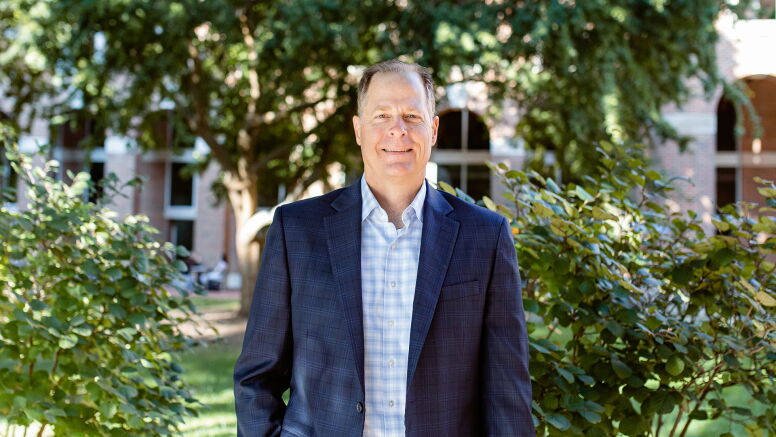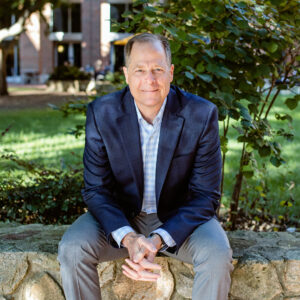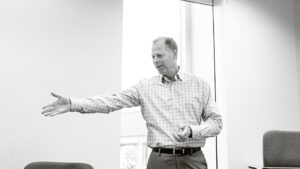News & Stories
Collaborating for change

You encounter low, stone walls as you walk around the campus at the University of North Carolina at Chapel Hill, the oldest public university in the U.S. You can easily step over these historic walls, which have come to symbolize both the importance of access to world-class education and Carolina’s culture of collaboration.
 David Hofmann seeks to strengthen both – collaboration and access to learning – in all of his leadership roles at UNC Kenan-Flagler Business School. That work has been most significant over the last six years as senior associate dean for academic affairs and is vital in his newest role – a new role for the School – as senior associate dean for UNC Executive Development.
David Hofmann seeks to strengthen both – collaboration and access to learning – in all of his leadership roles at UNC Kenan-Flagler Business School. That work has been most significant over the last six years as senior associate dean for academic affairs and is vital in his newest role – a new role for the School – as senior associate dean for UNC Executive Development.
Hofmann took up that inaugural position at UNC Executive Development in March 2022 at a pivotal time in the business world. Organizations’ demand for leadership development is surging as the pandemic eases. The need is greater than ever for cutting-edge, application-focused learning that enables leaders to successfully navigate new realities amid a range of ongoing global challenges.
“Ultimately, UNC Executive Development is successful if we help our clients succeed,” says Hofmann. “It is not about us. Instead, it is about our client-focused collaboration with the organizations we serve. At the end of the day, we design programs to develop leaders to be more successful in achieving their mission, strategy and goals.”
That customized approach is what differentiates UNC Executive Development. Hofmann and Stephen Hyde, president, are focused on designing custom programs that drive deep impact over time. They work with clients to design programming that addresses their critical business needs and skill gaps; engages key levels of leadership; and aligns talent development alignment with their practices, culture and goals.
What does a collaborative partnership with UNC Executive Development look like?
“Well, it’s based, in part, on our having the humility to truly listen to the client – probing and seeking to find the core issues presenting challenges to the organization’s growth and success,” says Hofmann.
“Of course, a true partnership involves bringing our expertise to bear and pushing back on ideas we have learned are not likely to work,” he says. “Simply put, we get aligned with our client on the end goals and then roll up our sleeves and work together – pushing and pulling – to end with the best learning experiences possible.”
 The dynamics of leading and teaching in custom programs are exciting. “We draw on our own expertise as well as the expertise in the room: the expertise of our clients. The combination creates a powerful learning experience,” says Hofmann. “Through this process, we explore important issues, such as psychological safety, decision making, fairness and organizational culture among many other topics.”
The dynamics of leading and teaching in custom programs are exciting. “We draw on our own expertise as well as the expertise in the room: the expertise of our clients. The combination creates a powerful learning experience,” says Hofmann. “Through this process, we explore important issues, such as psychological safety, decision making, fairness and organizational culture among many other topics.”
Helping organizations thrive and achieve their goals is an important part of UNC Kenan-Flagler’s mission to prepare leaders to make the world a better place, says Hofmann. “It is gratifying to continue our tradition of educational innovation and extend our collaborative culture to our client partnerships.”
Perhaps less well known but inspiring is UNC Executive Development’s work with government partners. UNC-Chapel Hill has a long history of engagement with all branches of the U.S. military, and many alumni are veterans of our armed forces including several at UNC Kenan-Flagler and in leadership roles within UNC Executive Development.
“Ultimately, UNC Executive Development is successful if we help our clients succeed,” says Hofmann. “It is not about us. Instead, it is about our client-focused collaboration with the organizations we serve. At the end of the day, we design programs to develop leaders to be more successful in achieving their mission, strategy and goals.”
“Contributing to sustaining national and global security in partnership with our military clients is an important component of UNC Executive Development’s impact model,” says Hofmann.
“Our deep and meaningful work with senior leaders in the U.S. military – both officers and civilians – has been under way for over 20 years,” says Hofmann. “We are honored and inspired by helping these leaders think strategically and globally, create diverse and inclusive organizations, and proactively respond to new environments in innovative ways.”
Hofmann, the Hugh L. McColl Jr. Distinguished Professor of Leadership and Organizational Behavior, joined the faculty in 2001. Over the next two decades he served as associate dean for the Full-Time MBA Program, area chair of organizational behavior area, and senior associate dean of academic affairs.
Having led both the faculty and academic programs, he knows the capabilities, interests and research of the entire UNC Kenan-Flagler faculty. This enables him to connect them with both existing and new clients around the most salient challenges and opportunities facing the business world.
Teaching programs are researchers steeped in the work of organizations and renowned business leaders who bring their managerial insights to the classroom, connecting theory and practice to address the organizations’ needs.
 Hofmann teaches courses in organizational behavior, leadership and the complexities of middle management. He designed the Leading in the Middle course to focus on successfully navigating the organizational structure, culture, and power dynamics of modern organizations.
Hofmann teaches courses in organizational behavior, leadership and the complexities of middle management. He designed the Leading in the Middle course to focus on successfully navigating the organizational structure, culture, and power dynamics of modern organizations.
He tackles these questions in his classes with future leaders and executives. “Most of our MBA graduates go and work in mid-management and are confronted by a whole host of organizational dynamics and competing priorities,” Hofmann says. “How do you get things done in that environment, both efficiently and effectively, while distinguishing yourself as a leader and continuing your growth trajectory in the organization?”
Hofmann is a recognized authority on the impact of leadership and organizational culture on safety and errors in organizations that operate in high-risk environments. An award-winning researcher, he has published a wide body of studies in top academic journals.
He helps leaders understand that they need to design systems to manage errors after they occur and before they cause significant harm. He has studied related issues in hospitals, along with the effectiveness of extroverted leaders, how to get employees to make better suggestions, and the dynamics around workers seeking advice from experts in their organization.
The visibility of that research landed Hofmann on two National Academies of Science Committees – one charged with investigating the BP Deepwater Horizon accident and the other charged with investing safety culture in the off-shore industry. In late 2022, he was appointed his third government commission: investigating and advising about safety culture for the U.S. Department of Commerce’s National Institute of Standards and Technology.
Outside the world of academia, Hofmann likes to spend time with family and friends and stays active. One of his most adventurous efforts was participating on an eight-person cycling team competing in the Race Across America. The ultra-distance road cycling race runs non-stop from the Pacific to the Atlantic, with teams traversing across the center of the U.S.
“It sounds impossible, but if you do the math, it turns out if you ride about 19.5 mph every minute, for six and a half days, you can do it,” he says. “As a person who studies, in part, team dynamics it was both fascinating and exhausting – and occasionally frustrating – all at the same time. And success really comes down to collaboration.”
“While that was over 10 years ago,” he says with a smile, “it is fun to reflect on that experience and think about the camaraderie we developed over the course of the week.”
It’s another example of using collaboration to overcome barriers to progress that Hofmann puts into practice wherever he goes.